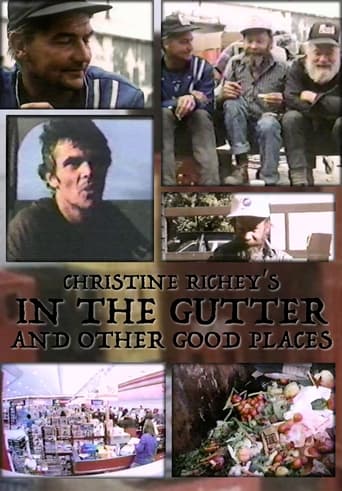foxynay
Though I was initially cold to this film, I soon realized how much it had impacted me- and not in a corny way but in a positive, thought-provoking way. I have become increasingly absorbed by the material in Ritchie's real/hyper-real film and, specifically, an article written about it: "In the Millenial Gutter" (Geoff Bowie, 1994). Though I could not possibly go into enough detail about the film here (I strongly encourage you to see it), I will say that the basic premise of it is the exploration and visual documentation of three 'dumpster diggers' and their day-to-day lives, including brief moments of retrospection into their past and how they got to be where they are today (f.y.i. it was shot in Calgary). What I would really like to focus on, though, is the wisdom and beautifully heart-wrenching simplicity with which these men express themselves. Each one is very different and has a different outlook on life and the camera following them. One in particular, Colin, is a 34 year-old ex classical pianist (or so he was as a child) who was also a straight-A student in grade school. His mother was diagnosed with schizophrenia when he was four and committed suicide by the time he was in his early twenties, which might account for his present state. However, he is one of the most eloquent interviewees I have seen all semester (and believe me, in this course, I have heard/seen a lot of interviews). With regards to being a social outcast, he once says (paraphrase) "what if I am the one on the inside, looking out at all of these ridiculous people going around and around in circles" (overtop of this comment we see sped-up visuals of the 9-5ers going in and out of the revolving doors on their way to and from work). What a thing to say… and yet… 'We' look down on 'them' but do they also look down on us? Anyway, not to get too off track in philosophical pondering, I wanted to mention one comment in particular: his last lines in the film, dealing with the state of society around him and its (society's) literal and figurative production of garbage. Says he, "people think of it as a disposable society. Lives are disposable. Human emotions are disposable. They say we have a high standard of living but we have a high standard of excess." Now, what does it say that perhaps the most meaningful social commentary, or social message, that I have received in a very long time comes from the mouth of a 34 year old dumpster digger, days before he took his own life? (Oh, by the way, he commits suicide- this is not really a spoiler as the film leads you to expect as much) Though the film does, otherwise, have a lot of faults (in my opinion)- for example, its stylization means that it treats the three men as great symbols for "the culture of corporate globalism" (Bowie) when they are, in fact, no more than three humble garbage pickers- what I can say for sure is that I recommend this film, and not just to quirky film students but to anyone remotely socially interested… it's a thinker, as my mum would say.
Jay Brown
A cold view of life on the street and in the shelters. You will feel sympathy for the people being followed, and guilty that you are glad you are not them. A very well done film. If it wasn't nominated for best documentary, it should have been.
Quint-13
This film is truly astounding--in almost innumerable ways. It is unlike any documentary I have ever seen. It documents the lives of three bottle/(refuse) pickers living in the Canadian city of Calgary, Alberta. Each one of these men are unique in their own right and each, unfortunately, suffer from one disease or another; whether is alcoholism or schizophrenia. That said, the film IS NOT, however, preachy or condescending about the pervasiveness and problematic attempts to solve homelessness and/or alcohol abuse. No. This film is a humane, moving, documentary--a portrait--of three unique individuals. It is also a bold statement to all of us: we produce a hell of a lot of garbage. We live in a society with not a high standard of living but with a "high standard of excess," as someone in the film tells us. The filmmaker, Cristine Richey, offers a wonderful opportunity to be part of a world so many of us do our best to avoid. One of these individuals documented in the film, Colin, is especially poignant and fascinating. This man was truly brilliant. A genius! What he has to say will not only shock you, but also enlighten you and leave you irrevocably altered. The cinematography is superb too. It has won several prestigious awards and I recommend it as, without any doubt, one of the best films I have ever seen. I am sure you will say the same.
